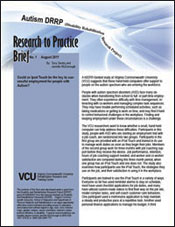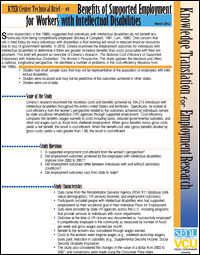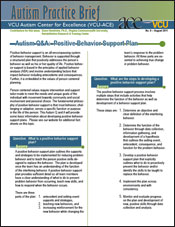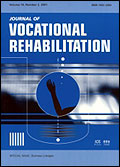Information, resources and research about work and disability issues
VCU Autism Center for Excellence Webcast
 Asperger's Syndrome and the Transition to Adulthood
Asperger's Syndrome and the Transition to Adulthood
Presenter: Gena Barnhill
Date: 6/12/2012, 3:30pm Eastern
This webcast is designed to introduce parents, educators, and professionals to effective strategies for supporting someone with Asperger's Syndrome (AS) in adolescence and adulthood. The webcast will provide a description of common strengths and areas of need present in adulthood and will focus on characteristics related to communication and social-emotional development. Dr. Barnhill will discuss services often required to address identified needs and strategies to support the individual as they strive to obtain employment, live in the community, and maintain social relationships.
Register for this webcast or Register for the Series. Cost: $50. * Free to Virginia participants.
VCU-ACE is funded by the VA DOE (Grant # 881-61172 H027A100107). For additional information, contact autismcenter@vcu.edu or (855) 711-6987.
VCU ASD Career Links Webcast
 Examining VR Service Provision & Employment Outcomes for Persons with ASD
Examining VR Service Provision & Employment Outcomes for Persons with ASD
Presenter: David Dean
Date: 6/18/2012, 2:00pm ET
The overall goal of this five-year project is to develop a framework to examine the efficacy of a specific mix of vocational rehabilitation (VR) services on short and long-term employment outcomes for persons with autism spectrum disorder (ASD). Two separate tracks have been pursued to obtain the necessary data to operationalize this model for identifying employment impacts of VR. The webcast will provide a progress report and findings from these two tracks. The first track involves examining longitudinal employment outcome and VR service provision data for applicants to the Virginia Department of Rehabilitative Services (DRS) during the periods of State Fiscal Years (SFY) 2000 through 2007. The second track examines the employment and disability benefit receipt of all VR closures with ASD nationwide from 1998 through 2008 using the federal R-911 Case Service Report merged with SSA administrative records. Cost $25. Register
This project is funded by the Disability and Rehabilitation Research Project (DRRP) grant #H133B080027 from the National Institute on Disability and Rehabilitation Research (NIDRR).
VCU ASD Career Links Webcast
Supporting Individuals with Autism Spectrum Disorders through a Model Public VR Program
By: James Rothrock, Joseph Ashley, Richard Kriner
Date: 6/22/2012, 2:00pm ET
In 2008, VCU-RRTC in partnership with the Virginia Department of Rehabilitative Services implemented the VCU ASD Career Links Grant, a federally funded research project for conducting evidence-based research on vocational rehabilitation (VR) service models for individuals with Autism Spectrum Disorders (ASD). For VA DRS, this research has resulted in agency investment in new practices and services, as well as positive employment outcomes for persons with ASD. Virginia's emerging model program for individuals with ASD may offer a solution for VR agencies facing a surge of new clients with ASD and a lack of existing research on evidenced based strategies to improve historically bleak employment outcomes. Find out More & Register Online. Cost is $25.
This project is funded by the Disability and Rehabilitation Research Project (DRRP) grant #H133B080027 from the National Institute on Disability and Rehabilitation Research (NIDRR).
Autism DRRP
 Facilitating Employment for Individuals with Autism Spectrum Disorders
Facilitating Employment for Individuals with Autism Spectrum Disorders
By: Tony Gentry and Jennifer McDonough
Individuals with Autism Spectrum Disorders (ASD) can offer unique talents and gifts to work and community environments. Most individuals with ASD want to become productive members of society, and society stands to benefit from their full community inclusion. As students with ASD transition from school to adulthood, selecting career paths are one of the critical choices that they must make. In addition, community rehabilitation service providers must identify strategies and supports to assist them in participating in the workforce. However, the primary and secondary characteristics of an ASD may present some distinctive and unique challenges for successful competitive employment. While each individual with ASD may present different behaviors and characteristics, there are supports that providers can provide to ameliorate behavioral challenges that often limit access to the community and work. This brief will provide suggestions on how to address these issues. Read the Research to Practice Brief #2 (PDF)
This project is funded by the Disability and Rehabilitation Research Project (DRRP) grant #H133B080027 from the National Institute on Disability and Rehabilitation Research (NIDRR).
KTER Center
 KTER Technical Brief #2: Benefits of Supported Employment for Workers with Intellectual Disabilities
KTER Technical Brief #2: Benefits of Supported Employment for Workers with Intellectual Disabilities
Some researchers in the 1980s suggested that individuals with intellectual disabilities do not benefit economically from being competitively employed (Brickey & Campbell, 1981; Lam, 1986). One concern that still is held today by many individuals with disabilities is that working will result in reduced financial resources due to loss of government benefits. In 2010, Cimera examined the employment outcomes for individuals with intellectual disabilities to determine if there are greater monetary benefits than costs associated with their employment. This brief will present an overview of Cimera's research, The National Cost-Efficiency of Supported Employees with Intellectual Disabilities: The worker's perspective. Read the Brief
SEDL has established the Center on Knowledge Translation for Employment Research (KTER) in partnership with Virginia Commonwealth University. The KTER Center is funded by The National Institute on Disability and Rehabilitation Research (NIDRR) Project Number: H133A100026
Upcoming Online Courses
![]() Into Adulthood: Transition to Work for Individuals with Autism - June 18 - July 30, 2012
Into Adulthood: Transition to Work for Individuals with Autism - June 18 - July 30, 2012
More than ever, individuals with autism spectrum disorders are participating in the mainstream of school, work, and the community. Careful transition planning from secondary education is critical for young people with autism spectrum disorders to be successful; however, there is limited information on this topic. This course will provide the participant with an in-depth understanding of the concepts related to positive transition planning for youth with autism. The issues, challenges, and strategies that are involved with helping young people with autism participate to the fullest degree in society will be examined. Cost: $275 Textbook: $25. Click here for details
![]() Job Development - July 2 - 30, 2012
Job Development - July 2 - 30, 2012
Job development is the "process of locating and creating work opportunities for individuals with disabilities". This is achieved by earning an opportunity to engage an employer and from there hopefully moving on to earning a commitment to meet, interview, and hire a specific job seeker. This course covers specific principles associated with job development via online lectures and readings and then requires the learner to take action on his or her behalf to further develop a particular skill. Participants also reflect upon what he or she learned from both the online content and field based experiential activity by sharing personal insights with other course members. Individual rate: $125 per person |
Group rate: $500 for 5 registrants. Click here for details.
VCU-ACE Q&A Factsheet
 What is Applied Behavior Analysis?
What is Applied Behavior Analysis?
Applied Behavior Analysis (ABA) is a scientific approach to understanding behavior. ABA refers to a set of principles that focus on how behaviors change or are affected by the environment as well as how learning takes place. The term, behavior, refers to skills and actions needed to talk, play, and live. While these principles impact everyone each day by shaping behavior, they can be applied systematically through interventions to help individuals learn and apply new skills in their daily lives.
ABA requires the implementation of established principles of learning, behavioral strategies and environmental modifications to improve and teach new behaviors. In practice, implementation must be systematic so teachers can identify how behavior can be changed and understand how learning occurred. The ultimate goal of ABA is to establish and enhance socially important behaviors. Such behaviors can include academic, social, communication, and daily living skills; essentially, any skill that will enhance the independence and/or quality of life for the person. Read the Fact Sheet
VCU-ACE is funded by the VA DOE (Grant # 881-61172-H027A100107). For additional information, contact autismcenter@vcu.edu or (855) 711-6987.
Subscribe today!
![]() The Center on Transition to Employment announces its inaugural Center News. The Center's research activities will be highlighted through regular updates in its e-newsletter. Each e-newsletter will feature information about one of the six studies underway as well as other related information related to the Center's activity and purpose. Subscribe today! It is free! By subscribing you will receive the Center's e-newsletter and other noteworthy announcements regarding the Center's activity, events, resources, trainings and publications.
The Center on Transition to Employment announces its inaugural Center News. The Center's research activities will be highlighted through regular updates in its e-newsletter. Each e-newsletter will feature information about one of the six studies underway as well as other related information related to the Center's activity and purpose. Subscribe today! It is free! By subscribing you will receive the Center's e-newsletter and other noteworthy announcements regarding the Center's activity, events, resources, trainings and publications.
For more information regarding the Center on Transition to Work, funded by NIDRR, visit www.transitiontoemployment.org
The Center on Transition to Employment for Youth with Disabilities Issue Brief
Risk Modeling of Student Post-School Employment Outcomes
For nearly 20 years, the National Longitudinal Transition Study (NLTS) has provided educators, policy-makers, and researchers with a national picture of students with disabilities in secondary education and their transition to adulthood. The original NLTS was designed and conducted by SRI International based in Menlo Park, CA, from 1985 through 1993 under a contract with the U.S. Department of Education, Office of Special Education Programs (OSEP).
The second round of the NLTS, the NLTS-2, began in 2001 again under the sponsorship of OSEP and the Institute of Education Sciences (IES). The NLTS-2 includes 11,270 youth nationwide who were ages 13 through 16 at the start of the study, and were followed for up to eight years following school exit to investigate such areas as community engagement, postsecondary education, and social interactions. What We Know
The Center for Transition to Employment is a Disability Rehabilitation Research Project sponsored by The National Institute on Disability and Rehabilitation Research, U.S. Department of Education. The Center is operated by TransCen, Inc. in partnership with Virginia Commonwealth University.
JVR Article
 Beyond yellow ribbons: Are employers prepared to hire, accommodate and retain returning veterans with disabilities?
Beyond yellow ribbons: Are employers prepared to hire, accommodate and retain returning veterans with disabilities?
by Hannah Rudstam, Wendy Strobel Gower, LaWanda Cook
Are employers ready to hire, retain and accommodate veterans with disabilities (VWDs) returning from engagements in Iraq and Afghanistan? A survey of 1,083 human resource professionals examined employer readiness in three areas: knowledge, beliefs/willingness and actions/practices, with an emphasis on the signature disabilities of Post Traumatic Stress Disorder (PTSD) and Traumatic Brain Injury (TBI).
Overall, employers surveyed did have willingness to employ VWDs and saw some benefits in doing so. Yet, they had key knowledge gaps around accommodating workers with PTSD and TBI and around disclosure issues. In the area of respondent willingness to employ VWDs, findings indicated most employers believed VWDs would benefit their organizations and would perform as well as other workers. Yet, they believed employing VWDs would involve more costs and more of a manager's time and were largely unsure if workers with PTSD were more likely than others to be violent in the workplace.
Respondents' actions/practices indicated that the majority were not using recruitment or other resources specific to VWDs and had scant experience in accommodating workers with PTSD and TBI. Implications of these findings are discussed in terms of research and application to impact employer knowledge, willingness and practices around employing VWDs.
*Join APSE to receive free online access to JVR
Upcoming Event
APSE 2012 National Conference - June 27-29, Pre-Conference Day - June 26, Crystal Gateway Marriott, Arlington, VA - More Information & Online Registration
 Worksupport.com
Worksupport.com